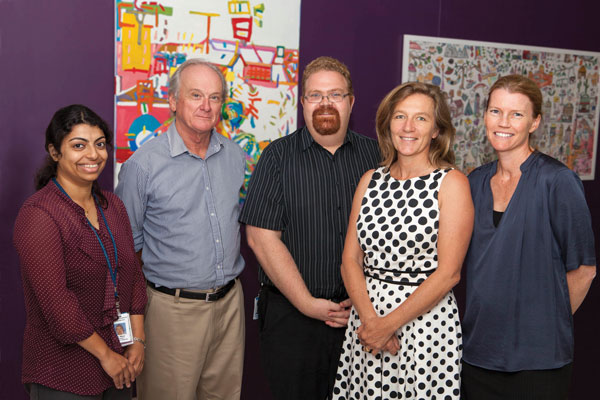Search

News & Events
High hopes for preventing lowsResearchers led by the team at the Children’s Diabetes Centre at The Kids have taken a key step to a fully automated closed-loop insulin delivery system.
Research
The usability and feasibility of a self-compassion chatbot (COMPASS) for youth living with type 1 diabetesAlthough it is well established that youth with type 1 Diabetes (T1D) experience high rates of distress, current clinical care is often under-resourced and unable to provide sufficient or timely psychological support. The current study was designed to evaluate the safety, usability and feasibility of 'COMPASS,' a self-compassion chatbot intervention.
Research
Development of a Novel Mobile Health App to Empower Young People With Type 1 Diabetes to Exercise Safely: Co-Design ApproachBlood glucose management around exercise is challenging for youth with type 1 diabetes (T1D). Previous research has indicated interventions including decision-support aids to better support youth to effectively contextualize blood glucose results and take appropriate action to optimize glucose levels during and after exercise. Mobile health (mHealth) apps help deliver health behavior interventions to youth with T1D, given the use of technology for glucose monitoring, insulin dosing, and carbohydrate counting.
Research
Disparities in Diabetes Technology Uptake in Youth and Young Adults With Type 1 Diabetes: A Global PerspectiveGlobally, nearly 9 million people are living with type 1 diabetes (T1D). Although the incidence of T1D is not affected by socioeconomic status, the development of complications and limited access to modern therapy is overrepresented in vulnerable populations. Diabetes technology, specifically continuous glucose monitoring and automated insulin delivery systems, are considered the gold standard for management of T1D, yet access to these technologies varies widely across countries and regions, and varies widely even within high-income countries.
Research
Real-world glycaemic outcomes in children and young people on advanced hybrid closed-loop therapy: A population-based study in Western AustraliaTo evaluate real-world glycaemic outcomes in children with type 1 diabetes commencing advanced hybrid closed loop therapy and to explore these outcomes based on the cohort's clinical and socioeconomic characteristics.
Research
Priority setting: Development of the South Australian Aboriginal Chronic Disease Consortium RoadMap for ActionAboriginal and Torres Strait Islander (Aboriginal) people in South Australia are overburdened by cardiovascular disease, diabetes and cancer. The South Australian Aboriginal Chronic Disease Consortium (Consortium) was established in June 2017 as a collaborative partnership to lead the implementation of three state-wide chronic disease plans using a strategic approach to identifying key priority areas for action.
Research
Short-Term Diabetic Retinopathy Status in People with Type 1 Diabetes Commencing Automated Insulin DeliveryRapid improvements in glucose control may lead to early worsening of diabetic retinopathy (EWDR). There is a need to demonstrate safety in people commencing automated insulin delivery (AID) due to the known efficacy in rapid glycemic improvement. We aimed to investigate short-term DR outcomes in people (aged ≥13 years) with type 1 diabetes after initiation of AID (use ≥6 months).
Research
Reduced prevalence of impaired awareness of hypoglycemia in a population-based clinic sample of youth with type 1 diabetesThe aim of this study was to determine the change in prevalence of Impaired awareness of hypoglycemia in adolescents with Type 1 diabetes

News & Events
Cholesterol and blood pressure drugs help teens with diabetesThe study involved screening young people to learn more about the development of long-term kidney, eye and cardiovascular complications in adolescents with T1D.
News & Events
Environmental factors could trigger rise in type 1 diabetesNew research from Perth's Telethon Institute for Child Health Research has revealed an unexpected pattern in the rate and incidence of type 1 diabetes
